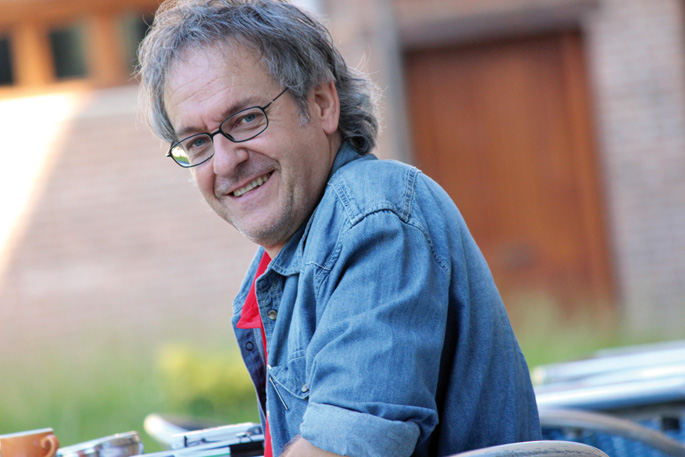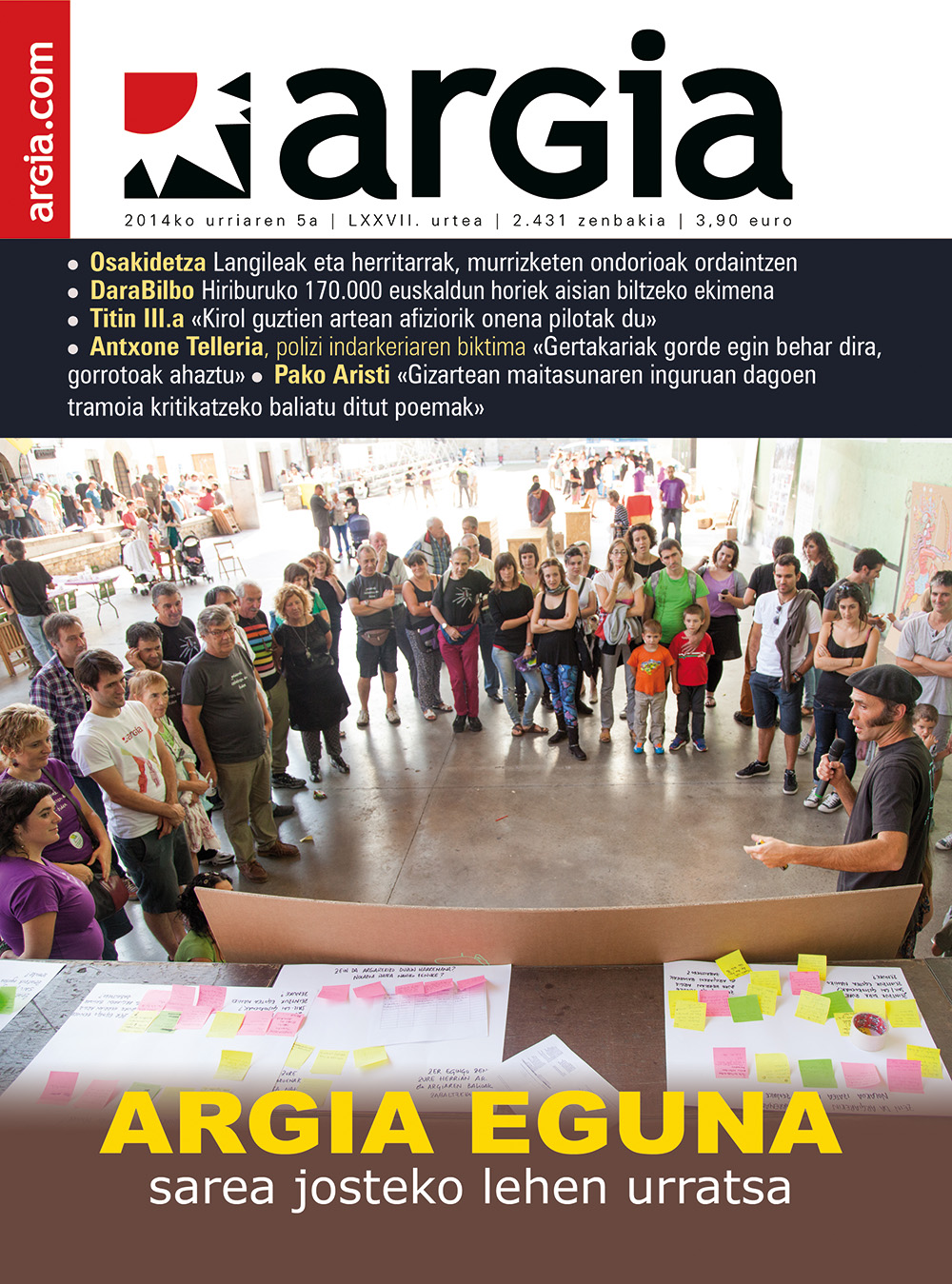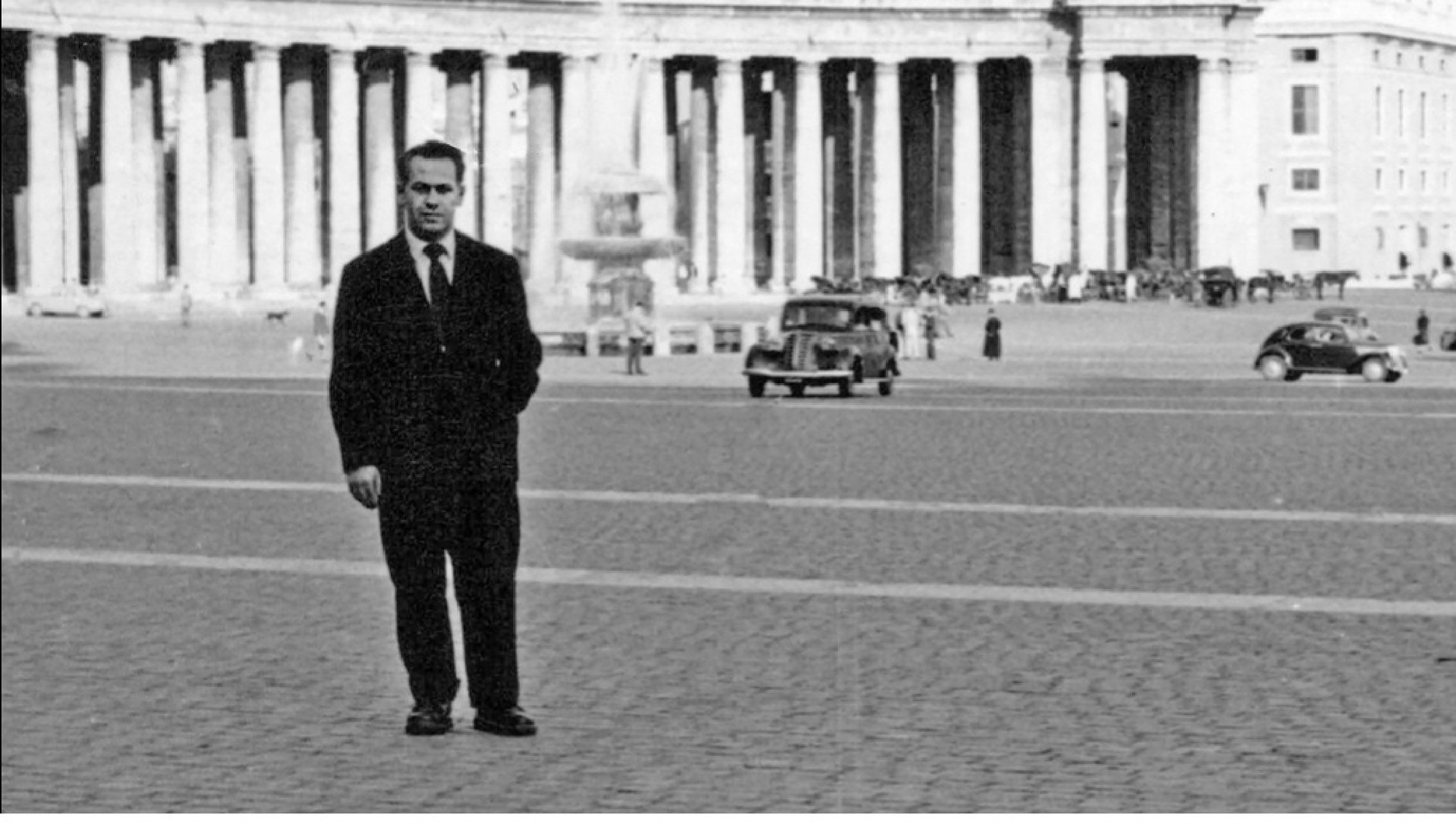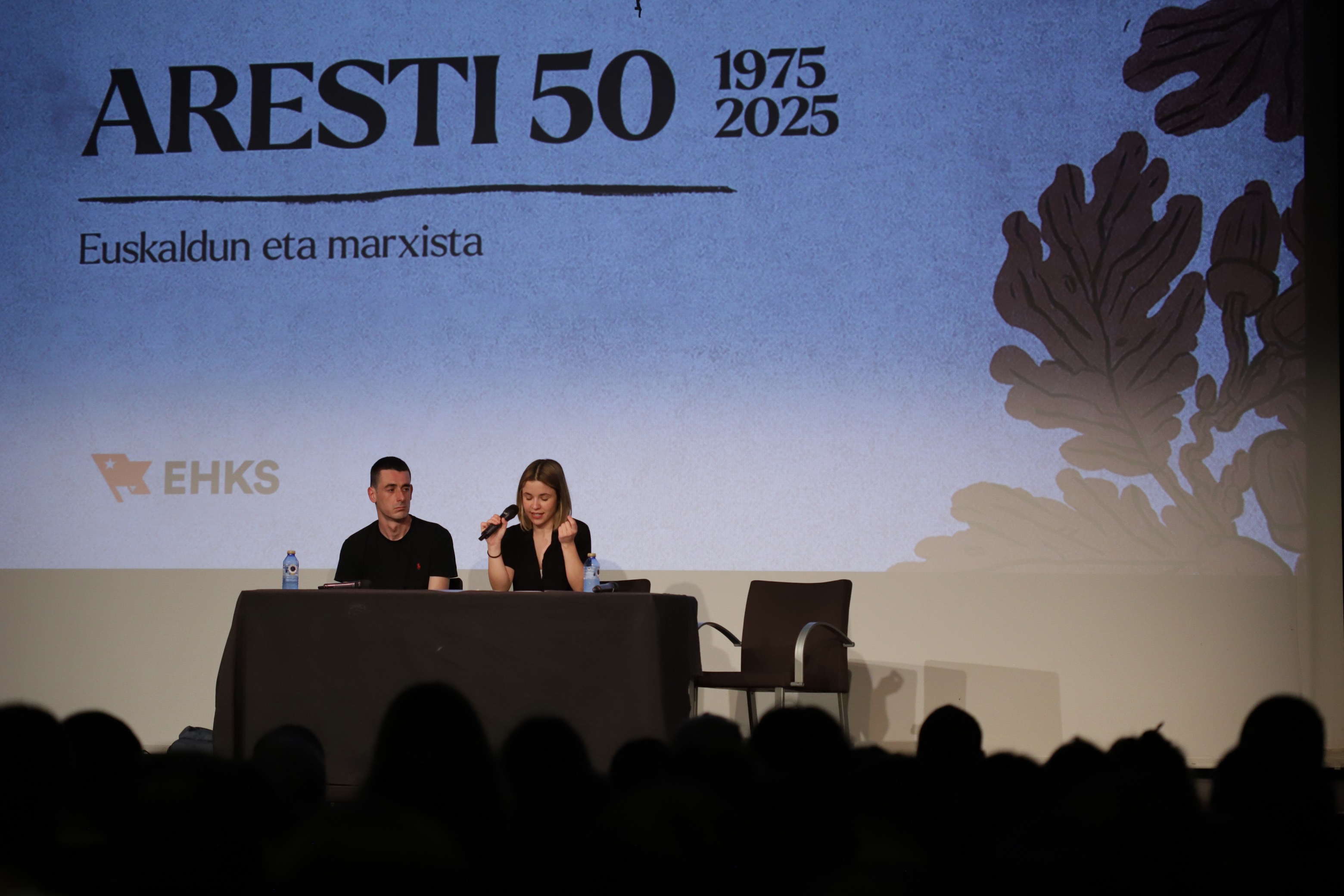"The spirituality of this book I don't see it apart from the real life of everyday life."
- The writer Pako Aristi has just published the book Ur ostutako poemak (Susa, 2014). Among those who have healed those of Urrestilla, the work he had not done so far, as before: Koldo Izagirre mentioned in the twentieth century “a thin existential thread that unites all the poems” of Aristi. In the 21st century Poetry Notebooks, the thread has not been interrupted in the current work. On the contrary, it is thicker than ever, due to the readings of the oriental authors.

Oriental thought is completely present in your new book.
More than Eastern thought, it's an attitude to life. Traditional and Western Judeo-Christian culture has a very tempting, dogmatic, aggressive attitude towards life. In the East, however, a long time ago I found other currents, which have a more calmer attitude towards life, which are not proselytists, not dogmatic, not invading consciousness. Here, in fact, from a young age, they introduce us to ideas that do not respect each other's freedom. In the readings of the Eastern authors I found greater respect for the person, and I liked that. Many of the thoughts in the book are common in the East and in many European writers, such as Hermann Hesse. Hinduism, Sufism, Taoism, etc. I have drunk a lot over the last few years. It's a way of interpreting life, in short, what I find interesting. At its base it is “here and now”. The projections of the future drown us. Rescuing the past is also a burden. “Here and now,” therefore. In life there are moments of discomfort, and in one of them I started to look for another attitude to try to understand life. I had the impression that there was a different way of understanding life, a different way of understanding it in our Western world. I realized that our culture, whether it be European, Christian Jewish or Greek philosophers, is nothing more than a small part of the world, which we live in the framework of a Eurocentrism, which we judge the world according to our Judaeo-Christian ideas. We see the world through our small magnifying glass. I took the hammer, broke my magnifying glass and started reading other books, trying to understand that world of the East, wanting to know about life… After all, the world is world and man is always human. Borges said: “I’ve traveled a lot and in every trip I’ve seen the same man.”
Water housing poems… “And the sea / paid its debt / through all the poems it has inspired for centuries.” You present the poem of Yates in a short preamble, and I thought you brought the sea. I start reading and your book is life… I go to the coast
many times. Sometimes I will walk, sometimes reading, but always looking at the sea. The hypnotic force of the sea is also there, always in motion, unlike the rocks of Azpeitia. I wonder if this motion of the sea has to do with passage and life. That is, at least, what makes me reflect on the poems of this book, on the march of the waves and on the stay on the coast. On the other hand, in the esoteric world, along with fire, wood and earth, water is the strongest indicator of feelings. In my case, these poems have emerged in front of the sea. I would come to my house and write. That's why I say in the title of the book that I've stolen the water, because the sea has made me born in me. Taoism also says that no one can be taught anything, that one can only want to seek the truth within one. It says that truth is not transferable, that when it is transferred it becomes dogma: poems were inside me, waiting to come out. In addition, at Getaria's Ketarri bar they had books for customers, and every day I read poems from the Swedish poet and Nobel laureate Tomás Transtömer. I can say that last summer I learned how to write poems thanks to Transtömer.
You're 50 years old. Is it time to think of life as it has been up to now?
It's possible. Now I've read some of Goethe that I liked: “The child is realistic, young, idealistic, mature, skeptical and old, mystical.” I mean, life has those four steps. Going in search of a spiritual path, that is mystical. In a poem, I mean that, the boundless energy that young people have, the limitation that the old man has: I knew the finitude of the body/ and the emotion of a question:/ whether our energy is limited/ what is in us that is not limited?… I live in a time when we set aside things that don't matter and look for essence. On the other hand, I have felt since I was little that I have not come to this world to repeat what the previous ones did, but to create something new. Transform tradition itself. This has been constant in my life.
“A thin existential thread”: life, the passage of time, death… In youth
there is no death. In other words, it exists, but we feel it does not exist, the environment does not die if it is not by accident. With age comes death and here we begin to understand that we are temporarily, that we are in rent here. Taoism also insists on that, on the lack of foundation, on the insignificance of our life. We believe that we are terrible, but in a hundred years' time nobody will remember that we exist. Taoism, and capitalism, proclaims the opposite: we must enrich and enrich ourselves, accumulate money until we die and then leave a prosperous heritage. I think not, that after an age things, ambitions, ego have to be discarded…
Love also appears strongly in many of the poems in this book. Love and disillusionment… the poem “Supposing love”, for example: “There have been many women in my life, but love has not been so great. / Identifying love with women / it has been my mistake”… It is said
“I poetic”, but the poetry book is made by a person, the material in the book was boiling in that person. To conceal, someone invented the “poetic self,” that is, a mask. However, the author is the same who signs, be it Szymborska, Beckett or Aristi. Answering her question, in this book the poet says he's been with many women, more than loving a lot. The poet begins to reflect, trying to distinguish between erotic and romantic experience and real love. After all, the poet criticizes the definition of love that has built our society. For example, an idea that society has built on love is good: people get married forever; when someone divorces, they consider themselves a disgrace and almost condolences. Perhaps the pain happens when they get married! "Get married forever?" Are you sure?” Society defines the world in a way, and the poet, on many occasions, has to disdefine it, ask questions, question it. "Have you been married for three years? It's OK!" I've taken advantage of poems to criticize the plot in our society around love. “Love is a flow / a flow until I understood it…”. As they say in the East, there is always a time to hug and another to leave Ea free from each other.
Beyond life, there are poems that are linked to our political situation, to political violence. “I, Rosa Ugartemendia Sarobe” – “23 years I have spent / in Spanish jails…” – or a Telegram – centered on
an attack – are evident in the tone of the book… Everything is life, in fact… To write those poems, I have based myself on Spoon River Anthology by Edgar Lee Masters. Written in the early 20th century, a classic in American literature. It tells the stories of a village cemetery. A tombstone, a poem, telling the person's life. That is where I was inspired to do those poems that you mentioned. They're more narrative poems, more narrative, if you like. Spoon River. Through the poem, I've dedicated myself to shortening the person's life, showing his lights and shadows. Life is life and, on the other hand, I live in a particular place of the world, in the Basque Country, and I am interested in our historical, political and social situation. The issue has been fashionable since ETA left its business, both in the literature and in parliament and in the rest. Through these poems I wanted to make my contribution, expose my vision…
They distance themselves from the line of the book,
however... The spiritual tone predominates, but I do not see that spirituality regardless of the real life of each day. Some say that reality and spirituality are two things, one is to be with friends, to do this and this, and another is absolutely different, to walk in the mystical mist of oneself, to make higher thoughts, to ask about the universe in the head. I do not separate the two parts, I want to break that dichotomy, add the two parts. According to the thinkers, the proof of one's own spirituality is the one that is best seen in everyday life. Our spirituality is useless if we are blind, brutal and unsupportive in our daily lives. That's also what I'm talking about in the book.
When people speak English, in their works there are titles, words or expressions in English, you bring us in Galician – at least in part – a poem: Aizkolari. The theme is the death of the aizkolari champion Joxe Mari Mendizabal…
It was amazing. I read the news in Galician, in Galician, in the event section of a newspaper. Morre dun infarto / a Basque aizkolari / dunha logo rifada aposta, / Also came to Galicia / the news of your sad death… The text had rhythm and rhyme. That same music made me write. I realized that the news was important in Euskal Herria, because Mendizabal was an admired athlete, because the wager was among them, because there was also a great age of aizkolari… Mendizabal was 63 years old. However, our mysticism approves it, although our culture of praise for the old aizkolaris is contrary to logic ... Here, a lot of things are done against logic and also against health. Eating the age you eat here, for example, is totally unhealthy. “San Sebastian is a city destroyed by gastronomy,” says a friend of mine. A pintxo and half a glass!... In the case of aizkolari Mendizabal, which here was a first-rate news, it was exotic in Galicia. That's how the poem emerged. I wonder what Mendizabal needed to wager on, what a hole was inside… The music gave
him to create the beautiful poem Aizkolaria. How, moreover, has it managed to shape poems?
Many times, some phrases come to us. When the spark or idea of the text is created, the phrase also comes. Then there is no more to throw him away. This is what García Márquez said, who had always attached great importance to the beginning of the novel, to the first line, since in it was the germ of the whole novel. The same happens to me in the case of poems: I adapt the body of the poem to the equation of the initial phrases, I follow the tone marked by those phrases, without breaking that path… Then comes the cooking of the poems, work again and again until we get the balance within the text. This is also what Zumeta says: “Painting is, in the background, very simple: one color there, another one here… It’s a matter of balance.” Balance is the indicator of beauty and we have to achieve balance in the sentences, in the tone… It is artisanal work to write poems, but next to the traditional craftsmen it is a very puti work – I don’t know how it will put it – because when an artisan dominates the trade he knows that furniture will work well, but we never know if the poem, the story, the novel… or bad.
The reader will say…
But there are also things there: what one has given for good, the other does not like. We don't know who to listen to. In the end, it was best not to do anything to anyone, no one but himself. In fact, everyone is responsible for the book, its name comes in the book: if the work is good, it is the author's merit; if the book is bad, it is also the author's fault. Everyone.
Poems of the yellow book (Susa, 2003) is the previous book of poems. What has changed since then in your poetry?
Eleven years ago I published poems from the Yellow Book! Social poetry was there, if you like, but the seed of Ura… is in some of its poems. He had as his axis the situation of Euskal Herria, it was written in an easy way to read – I know that many young people read it, copied some poems and put them on the wall – but this time he has moved away from that book, as I have walked away from it eleven years ago… I say, this is not so easy, not so simplistic. That book was populist, this is more demanding. It had a more standard level of wisdom, in which the reader is required to be closer to the author's existential process. Or maybe, without being so close, you feel drawn to new worlds.
Will you take public action?
Yes. Anyway, this time I'm just going to use the voice. For many years I have been accompanied by Mikel Markez's music, but editor Gorka Arrese told me that music, multimedia and the rest of the fashions are past water. We've gone from sophistication to nudity. Therefore, neither music, nor the tide of the sea, nor photography. Hollow. I've worked improving the diction with actress Itziar Gómez and I'm willing to read it in public.
“Gizarte konbentzioen kontrakoa izan naiz beti. Konbentzio horiek lotu egiten ninduten, kortse baten moduan. Gizarte honek balioesten ez zituen gauzak egin nahi nituen nik. Gizarte hau hiperkapitalista da, euskal gizartea kokoteraino da kapitalista: hemengo enpresak, hemengo dirua egin beharra… Niri, berriz, ankerkeria ikaragarria iruditu zait hori beti, bizitza disfrutatzea galarazten duen jarrera. ‘Lan egin, lan egin, lan egin… dirua aurreztu, aurreztu, aurreztu… etxea erosi, erosi bat, erosi bi…’. Bizitza disfrutatzen ez du uzten horrek. Ekialdeko gogoeta bidea Mendebaldera ekarri duenetako bat da Osho, Indiako mistikoa, Thomas Merton, Krishnamurti eta beste hainbatekin batera. Oshok, esaterako, bi pertsona mota bereizten ditu: anbiziodunak eta ospatzaileak. Batzuek, dirua pilatu besterik ez dute buruan; besteek, egunero bizirik daudela ospatu nahi dute, osasunez, lagunarte ederrean. Nik, umetatik dut ospatzaile gogoa, dirua irabazteak aspertu egin nau beti; hori bai: egindako lana kobratzea gustatzen zait. Bi gauza ezberdinak dira”.
“Mesfidantza handia diet hitzei; gero eta handiagoa, gainera. Hori gauza larria da idazlearentzat, idazleak hitzak baliatzen ditu-eta bere lanean. Hitzak, berriz, oso aldakorrak dira, eta eskasak, norberak adierazi nahi duena adierazteko. Sufiek diote hitzak oskola besterik ez direla, ideia bat transmititzen dutela, baina ez dutela balio errealitatea bereganatzeko, eta osotasunean beste norbaiti agertzeko. Hortaz, ez fidatzeko gehiegi hitzekin. Ni, iritzi horretakoa naiz, hitzetan tragedia gehiago ezkutatzen dela, sarri, benetako gertaeretan baino. Alegia; gertatu zaigun hori, ezartzen dizkiogun hitzek bihurtzen dutela izugarri tragiko, askotan. Gure bizitzako gertaerak bakean utziko bagenitu, ez lirateke hain mingarri izango sarritan. Minaren sortzaile geu gara, ez bizitza”.
Now that everyone has become more Franciscan than the Pope, it’s worth remembering our unsurpassed classics. There was one in the 17th century, his grace was Arnaut Oienart. And since we can’t immerse ourselves in all his works, today we will praise O.ten youth in... [+]
Aurreko tertuliako galderari erantzuteko beste modu bat izan zitekeen, akaso modu inplizituago batean, bigarren solasaldi honetako izenburua. Figura literarioaz gaindi, pertsonaia zalantzan jartzeko, edo, kontrara, pertsonaiaren testuingurua ulertzeko saiakera bat. Santi... [+]
Astelehen honetan hasita, astebetez, Jon Miranderen obra izango dute aztergai: besteren artean, Mirande nor zen argitzeaz eta errepasatzeaz gain, bere figurarekin zer egin hausnartuko dute, polemikoak baitira bere hainbat adierazpen eta testu.
Martxoaren 17an hasi eta hila bukatu bitartean, Literatura Plazara jaialdia egingo da Oiartzunen. Hirugarren urtez antolatu du egitasmoa 1545 argitaletxeak, bigarrenez bi asteko formatuan. "Literaturak plaza hartzea nahi dugu, partekatzen dugun zaletasuna ageri-agerian... [+]
1984an ‘Bizitza Nola Badoan’ lehen poema liburua (Maiatz) argitaratu zuenetik hainbat poema-liburu, narrazio eta eleberri argitaratu ditu Itxaro Borda idazleak. 2024an argitaratu zuen azken lana, ‘Itzalen tektonika’ (SUSA), eta egunero zutabea idazten du... [+]























